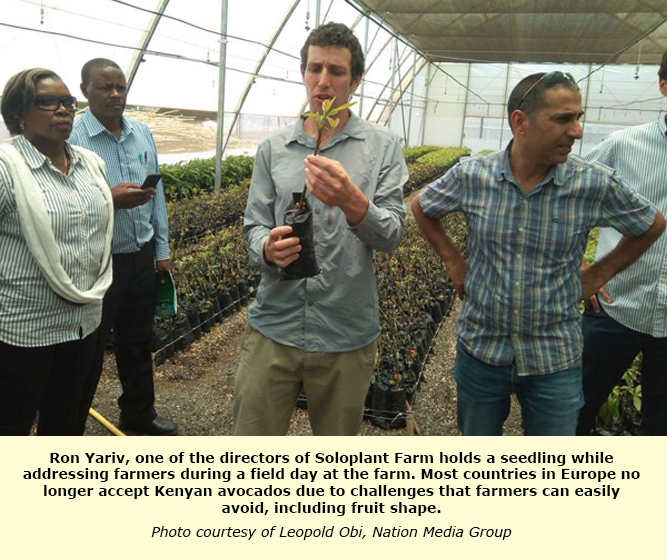As demand for avocados grows locally and internationally, there is no short cut for farmers seeking the best market and prices.
One must get it right when it comes to varieties, seedlings and fruits, especially if planning to sale in the export market.

Brian Gesimba, the agro-marketing manager at Amiran Kenya, says that it is important for a farmer to start with clean and high quality planting materials to get higher yields.
“The export market requires quality produce, that is why it is not advisable to buy seedling from roadside sellers,” says Gesimba, who is also in-charge of avocado management at Soloplant, a gated farm off Kabati in Thika, which specialises in propagating and sale of grafted Hass avocado seedlings.
He notes that avocado can virtually grow well in all parts of the country apart from the coastal region due to salinity.
Ran Kadosh, also an avocado specialist at Amiran Kenya, says the fruits should be planted on ridges to avoid waterlogging which causes root rot.
The plants can be irrigated through drip pipes, and water must always be available.
“For export quality, the tree should be planted in 6 by 4 metres spacing or there about, in between the spaces one can grow weeds or vegetables to control soil erosion and to attract beneficial insects.”
Besides, the plants need proper lighting during flowering. Farmers, therefore, must allow light penetration and control of pest and disease.
Ron Yariv, one of the managers at Soloplant, advises that before planting avocados, one must conduct a feasibility study on the proposed farm before investing.
“You need to consider water availability, the soil characteristic and the prevailing climate conditions.”
The Kenya Advantage
Kenya currently produces 200,000 metric tonnes (MT) of the fruits per year yet only exports 16,000MT. Israel, on the other hand, produces 100,000 metric tonnes of the fruits but exports 60 per cent of the total.
The US is currently the most dominant market for avocados followed by Europe and the far East Asia.
The regions are supplied by farmers from the Latin America, South Africa, Spain, and Israel. Roy Van Grevenbroek, a marketing expert working for Mehadrin, one of the world leading avocado exporters, says Kenya lags in avocado export because the fruits lack uniformity.
Most countries in Europe no longer accept the Kenyan avocados due to challenges that farmers can easily avoid, including fruit shape.
He notes the export market demands fruits of certain shapes and sizes, features which can only be achieved through irrigation of the crops.
“Avocado farmers in Kenya do not irrigate their farms as a result their fruits lack uniformity, some are too big, others are medium while others are smaller than the required minimum,” he says.
Buyers at the export market prefer size 12 fruits with dry matter content of 23 per cent.
Another challenge with Kenya farmers is that they pick their fruits too early, therefore, they take too long to mature.
However, Van Grevenbroek notes that local farmers have advantage over their peers in other countries because Kenyan fruits arrive at the market at the time when none of the leading producers have fruits.
“If avocado farming in Kenyan is professionally done, then it can be another success just like flower farming because it’s harvesting window fall at the best time for Europe.”
Source: Daily Nation
